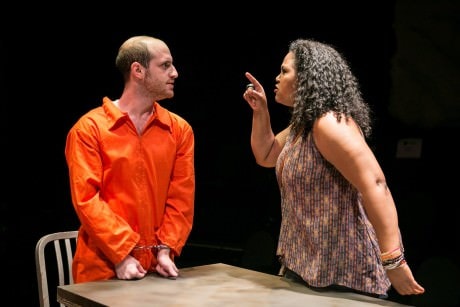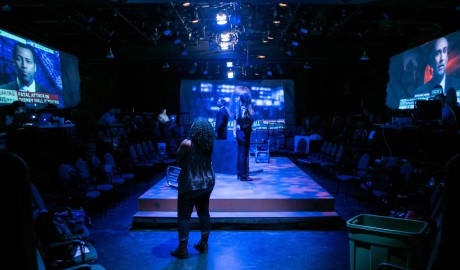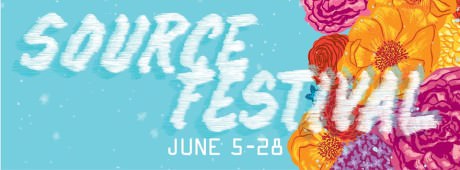At the center of this taut, trenchant play by Timothy Guillot is a fascinatingly enigmatic character named Benjamin Harding. He has very few lines. For the better part of two hours, Joshua Simon performs the role in eloquent silence. With his hollow, glaring eyes, his haunted face and calibrated body language, Simon keeps the character’s secrets and holds our attention hostage.

As we learn from a cacophany of breaking-news broadcasts projected on vast screens around the theater, Benjamin Harding is in prison in L.A. and under FBI investigation for a terrorist bombing attack on the Walt Disney Concert Hall that killed 225 people and injured hundreds more. Over the two acts that follow, the tension sprung from that circumstance lets up only intermittently for the kind of nervous laughter that puts the screws on tighter.
Harding appears to fit exactly the profile of nearly every sullen, inscrutable white man who has committed senseless mass murder in the U.S. in recent memory; that much is typical. But Guillot’s very atypical plot gimmick, which makes this play keep ticking like a time bomb, is Harding’s request to have his poetry read by a black woman poet from New York City. Her name is Elizabeth (“Lizzy”), and Benjamin has been following her performances of her own poetry on YouTube. “I’m your biggest fan,” he tells her in their first meeting, which has been arranged against her will by the FBI as a means to get their clammed-up suspect to talk. Tamieka Chavis plays Lizzy with striking inner strength and gravity and vividly expresses the sense in which both poet and suspect are being held captive.
Joshua W. Kelley, who has deftly directed this gripping drama, sometimes sets up scenes that overlap in time and share the same stage. Thus early on we see the two FBI investigators battle over tactics—new-to-the-force Katherine (played whip-smart and poised by Sarah Ferris) and her gratingly overbearing boss Richard (played brashly by Greg Thompson)—even while we see Benjamin tremulously give Lizzy the handwritten poem he wishes her to read on camera.
As the play gathers momentum and menace, Lizzy’s YouTube delivery of Benjamin’s poem goes viral, and mainstream news outlets latch on to the trending story, turning Lizzy and Benjamin into media phenoms. Lizzy’s initial reluctance to be involved is replaced by a sympathetic interest in Benjamin, even as he is demonized and dissected by more and more pundits.
Benjamin, we learn, grew up in the Deep South, and his abusive father was a white supremacist who actively supported the Klan and similar hate groups. We also learn that Benjamin has a brother, Woodrow (played by Zach Bopst with a touchingly awkward sinisterness).
Guillot has crafted a shrewd and evocative script that is propelled by crackling dialog, a mesmerizing narrative, an astute spin on media, and the aforementioned enigma, Benjamin Harding. Not only does the play keep us wondering what makes Harding tick; it turns our voyeuristic curiosity into a measure of concern for the character—an identification that reaches unnerving intensity in a scene when Benjamin is brutally beaten (and Simon’s nearly soundless anguish then is chilling).

What ultimately impressed me most, however, is what the play leaves completely unremarked and unexamined. It’s almost as if, like the central character Benjamin Harding, it maintains its own right to remain silent. That extraordinary unspokenness has to do with race, a topic never mentioned, either explicitly or referentially, as a theme of the play. By the end, though, the play’s silence on the issue is deafening. Here is a young man, Benjamin, who was literally born to racism; everything about his family upbringing was exactly the sort that imbues children with race hate. Yet the one person in the world Benjamin chooses to trust with his truth is a black woman poet from Harlem.
None of the media commentators who keep showing up onscreen make any mention of that obvious fact; nor does it occur to the FBI investigators as a piece of the puzzle they’re trying to solve. Part of this play’s brilliance is that it leaves us the audience that provocative lead to follow in our own mind on the way home.
Running Time: Two hours, with one 15-minute intermission.
The Word and the Wasteland is performed on June 13, 21 and 26, 2015 as a part of the Source Theatre Festival 2015, at The Source Theatre – 1835 14th Street. NW, in Washington, D.C. For tickets, call (866) 811-4111, or purchase them online.





